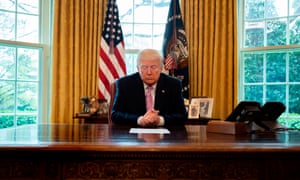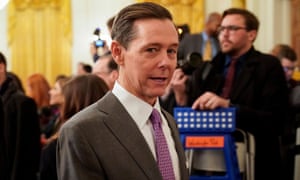Amid the evasions and distortions lies evidence that Ralph Reed knows, really, that religion and politics can mix to noble ends – just not under this president

Photograph: Jim Watson/AFP via Getty Images
Ralph Reed, an evangelical leader and conservative political activist, first met Donald Trump in 2011, after being “coincidentally” seated next to Ivanka Trump at a meeting. The following year, he writes now, at his own Faith & Freedom conference, Trump “bounded on stage to the thumping strains of ‘Money, money, money’ from For the Love of Money, a song by the 70s soul group the O’Jays”.
On the page and off, Reed is usually quick to provide apposite quotes from the scriptures. In a book that is part history of the 2016 campaign, part apologia, part work of political theory, and part political shell game, he chooses not to include here 1 Timothy 6:10: “For the love of money is the root of all evil.”
Reed purports to offer “the Christian Case for Trump” but his preaching is largely to the converted – and, most urgently, to those worried by the potential flames of Joe Biden.
For Reed, Trump offered an appealing path: “With his money and celebrity, combined with a socially conservative message aimed at evangelicals, he could make a serious run” for president and secure policy victories galore.
Reed is very fond of Mike Pence, and likely wishes the vice-president were top of the ticket this year. But he sees success under Trump on issues including abortion, religious freedom, support for Israel and helping ex-offenders re-enter society through the bipartisan First Step Act.
Ultimately, abortion and the supreme court are more important than personal failures. Talk about issues and a dig at Hillary constituted Reed’s response to the misogynistic Billy Bush video, in which Trump boasted of sexual assault.
Reed writes that “Trump has led with great moral clarity [on religious freedom]. If keeping one’s word is central to one’s character – and it clearly is – then Donald Trump has shown he has far more character than his critics.”
Writing about the appointment of Neil Gorsuch to the supreme court, Reed claims “all the doubts, reservations, even suspicions – every one of them had been false.”
Every one?
Reed’s reliance on the “teaching of Jesus about the difference between words and works” is misplaced. He writes: “I measure a man more by his actions than by the occasional rash or ill-advised word.” How about false? Allegedly defamatory? Demeaning? Belittling? Racist?
And this: “I have learned to be suspicious of the smooth talker who never delivers.”
As have those who plumped down money for Trump University.
This is pure and simple advocacy, and it is deceptive. Reed’s statements often have qualifications, feints and writing designed to obscure or distract. For instance, he writes: “The fact that [Trump] didn’t act or talk like a typical evangelical, didn’t come from the Bible Belt, and didn’t attend a Christian college or quote scripture also meant he could reach a new – and larger – audience.”
What’s missing here? Oh yes – Trump didn’t usually attend church. (Barack Obama did, generally at Camp David so as not to disturb worshippers in regular churches.)
In essence, Reed invites readers not to look behind the curtain, positing instead a simple choice between Trump and “liberals”. His first and last chapters focus on the left, with bonus “Crooked Hillary” and “Liberal Hypocrisy” in the middle. Elsewhere, it’s Trump or “civic withdrawal”, a true straw argument.
Some of his political science has a point. Trump did talk about issues that mattered to many voters. But Reed can’t quite make up his mind.
“[E]vangelicals gravitated to Trump with ambivalence and more than a little reluctance,” he writes. “Some were dragged kicking and screaming to the voting booths.”
He seems happiest at a rally in Valdosta, Georgia: “It was as if a seventies band reunion had met a Nascar race – all for the enjoyment of the great unwashed of the American heartland, the forsaken and forgotten, the rejected and looked-down upon … these voters had found their Pied Piper, and his name was Donald J Trump.”
Following the Pied Piper did not end well.

Does Reed really believe all this? Occasionally, glimpses of an earlier Republican party and flashes of honesty peek through the rhetoric. He gives some play to the opposition of evangelical critics such as Russell Moore, Al Mohler and Mark DeMoss. He offers nice words on the former Ohio governor John Kasich and Medicaid expansion. He writes that “[Jesus] showed concern for people’s physical needs for food, water, shelter and health, and so should we.” He even comments favourably on Hillary Clinton’s faith and devotional life.
And he is correct that many evangelicals did change their views on politicians who commit immoral acts. But here are straw arguments again: “Does the Gospel teach that someone who has had a personal moral failing is disqualified from serving in a position of public trust? In fact, the Bible teaches the opposite, offering redemption and hope through faith in Christ to all sinners.”
Curiously, Reed uses the example of Peter’s denial of Jesus and subsequent office in the church rather than the most obvious example in the state: King David’s adultery with Bathsheba and murder of her husband.
The key is – or should be – repentance, and Reed claims Trump “freely acknowledges … flaws and mistakes of his past”. Then why so many false statements, including those that are easily checkable? Avoiding responsibility seems the exact opposite of repentance – and leadership. Reed also omits Trump’s appalling behavior at two National Prayer Breakfasts.
Reed’s definition of the 2016 election is flawed: a choice between “diametrically opposed political agendas – one of which embraced the intrinsic good while the other advanced grave evil”. Surely, too narrow a definition on both counts.
Simple distortions of fact abound, formed by putting one hand on the scale and ignoring other evidence. Reed is quick to dismiss accusations against Trump while not giving the full story. His chapters on Russia and impeachment are particularly, almost clownishly one-sided.
Reed writes of “the Russia hoax”. Robert Mueller said election interference “was not a hoax”. Reed writes the Mueller investigation had nothing “to do with criminal wrongdoing”. Mueller said he would have cleared Trump if he could have but did not. We are a long way from the concerns of evangelicals – other than integrity in public life.
Reed calls impeachment “a partisan joke”. He also states that his Faith & Freedom Coalition offers no endorsements but merely presents candidates’ statements on issues. Then why not do the same for Lt Col Vindman, Ambassador Yovanovitch or Mueller? Reed quotes Hosea 4:6: “My people perish for lack of knowledge.” Indeed.
Sometimes, he gets the theology right. Political power should indeed be used “primarily to glorify God”. He quotes Psalm 146: “Put not your trust in princes.” And he wishes that whatever the outcome of the 2020 election, “We will glorify God and be witnesses in our time for the transcendent, heavenly values that can transform society today.”
That is a noble vision, far removed from the “muck and mire of politics”. In the end, there’s not really much of a case for Trump here.


